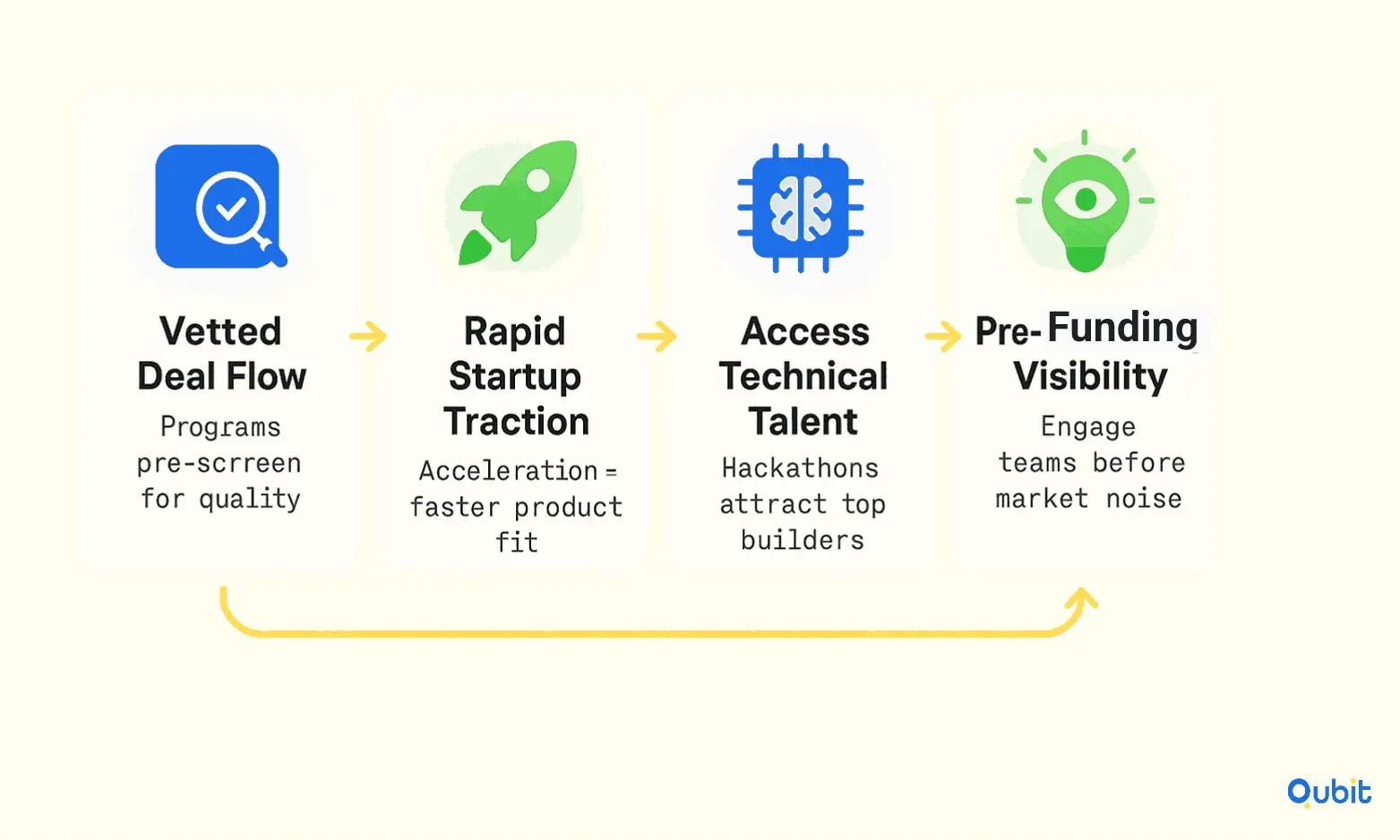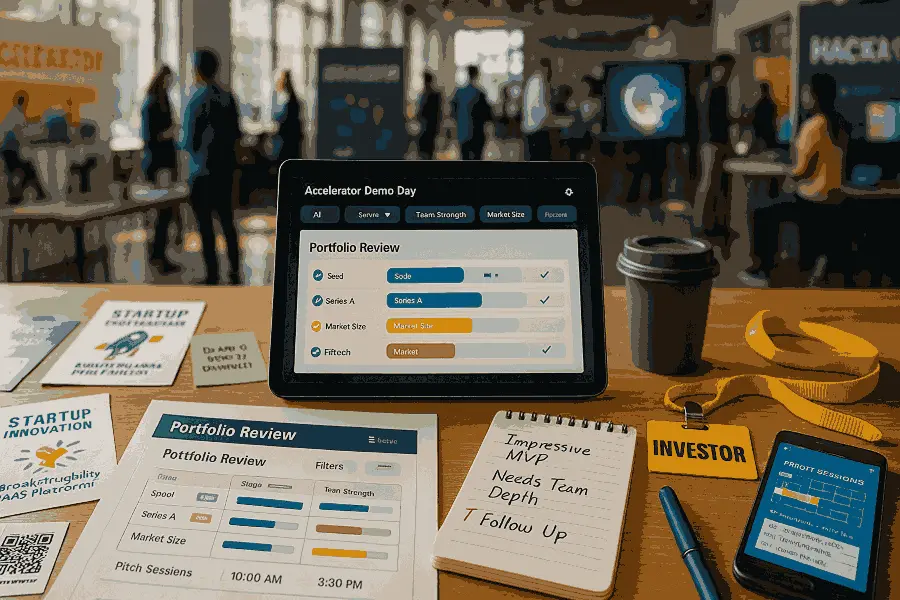The startup ecosystem is evolving rapidly. As digital disruption and innovation cycles accelerate, investors are seeking sharper ways to spot the next generation of high-growth companies. Among the most fertile grounds for early-stage investment opportunities today are accelerators and hackathons. These platforms, densely populated with emerging talent, raw ideas, and curated ventures, are goldmines for savvy investors seeking outsized returns.
But what does it really take to scout top startups effectively from these dynamic environments? This comprehensive guide explores why accelerators and hackathons matter, actionable scouting strategies, evaluation frameworks, and best practices that differentiate successful investors from the rest.
What is Accelerator Scouting and Why Does It Matter?
Accelerator scouting is the targeted process of identifying, evaluating, and engaging startups participating in accelerator programs or hackathons. These environments are ripe for innovation and often serve as launchpads for startups on the verge of explosive growth. But why should investors devote resources to these channels?

- Vetted Deal Flow: Startups in accelerators are pre-selected by program managers, ensuring a base level of quality and ambition.
- Rapid Traction: These programs are designed for speed, helping startups refine their business model and product in compressed timeframes.
- Emergence of Technical Talent: Hackathons regularly attract the sharpest minds unveiling practical, investment-ready innovations.
- Access to Untapped Teams: Investors have a chance to engage with ventures before fundraising is competitive, or even before a team formally launches.
Why Focus on Accelerators and Hackathons?
Accelerators and hackathons have transformed the early-stage deal funnel. They act as crucial filters:
- Accelerators provide structured programs offering mentorship, resources, and seed funding to promising startups over 3–6 months, culminating in Demo Days where founders pitch to investors.
- Hackathons are intensive, fast-paced events where teams build prototypes and solutions around specific challenges in 24–72 hours, often pitching these to a panel of judges including investors.
Both environments naturally attract ambition, foster innovation, and offer high-density access to entrepreneurial energy a much more efficient model than one-by-one deal hunting.
The Upside for Investors
- Pre-vetted Talent: Most accelerator cohorts are screened for potential, while hackathon winners have proven they can execute under pressure.
- Access to Early-Stage Ideas: Investors can claim stakes before startups become widely known.
- Direct Engagement: Investors interact with founders, observing team dynamics and technical execution first-hand.
- Community: Accelerators and hackathons forge networks with other investors, mentors, and corporates expanding your investment horizon.
Building a Modern Startup Scouting Playbook
Step 1: Define Your Investment Thesis
Your scouting efforts should align with your sector focus, geography, and stage. Building your scouting foundation begins by crystallizing your strategy discover more on proper thesis setting by exploring proven startup scouting strategies.
Step 2: Proactive Deal Sourcing
Gone are the days when investors could wait for startups to find them. Modern dealmakers deploy proactive discovery techniques:
- Leverage Demo Day Lists: Request shortlists from accelerator organizers before demo days.
- Monitor Hackathon Winners: Track top projects via event pages and community announcements.
- Participate as Judges or Mentors: Early engagement leads to insider access and rapport with founders.
- Automate Alerts: Use Google Alerts or custom scripts to spot new accelerator cohorts.
For more on orchestrating a proactive process, take a look at building a proactive deal sourcing strategy.
Step 3: Balancing Inbound vs Outbound Scouting
Relying solely on inbound interest or outbound hustle misses out on the magic in the middle ecosystem deal flow. The best investors optimize every channel:
- Inbound: Applications, referrals from accelerators, and unsolicited founder outreaches.
- Outbound: Pursuing high-potential teams at demo days, hackathons, or via their public profiles.
- Ecosystem Links: Tapping mentors, alumni, and operator networks for warm introductions.
Maximizing Returns at Accelerators and Hackathons
Before the Program
- Research the accelerator’s track record, what’s their alumni success rate?
- Engage with program directors for access to shortlists and exclusive, invite-only events.
- Prepare scorecards to evaluate potential investments aligned with your thesis.
During the Program
- Attend public sessions and leverage Q&A to gauge team depth.
- Build rapport with startups by offering feedback and mentorship, not just money.
After Demo Day or Hackathon
- Move quickly: Top teams often receive multiple offers within days.
- Personalize your post-event communication, referencing specific projects improves response rates.
Find more event-specific tactics for investors by mastering startup scouting events tactics.
The Scouting Process: From Pipeline to Portfolio
Scouting startups is more than just showing up to Demo Day or a hackathon’s closing ceremony. Here’s a proven step-by-step process for maximum effectiveness:
1. Preparation: Define Your Investment Thesis
Know What You Want
Before entering an accelerator or hackathon ecosystem, clarify your investment thesis. What sectors, technologies, or themes excite you? What stages or business models do you prefer? Having a focus ensures your efforts are not diluted in the noise.
Build Criteria
- Sector fit (aligned to your expertise/interests)
- Stage (MVP, growth, etc.)
- Team background
- Market size/potential
- Differentiation (technology, business model, IP)
2. Pipeline Building: Where to Look
Engage with Accelerators
- Top Accelerators Globally: Y Combinator, Techstars, Seedcamp, Plug and Play, Startupbootcamp, India Accelerator, Axilor Ventures, 9Unicorns, and more.
- How to Engage: Join Demo Days (on-site or virtual), become a mentor, or join “office hours” as a guest investor. Being proactive as a mentor/advisor often leads to more privileged access to hot deals.
Participate in Hackathons
- Global & Corporate Hackathons: Find problem-focused events where startups align with your target sector.
- Judging/Scouting: Offer to judge, mentor, or sponsor getting up-close with both participants and the structure of the event.
Online Platforms and Databases
- Use directories like Crunchbase, AngelList, Pitchbook, and F6S for ongoing monitoring and to spot portfolio startups from accelerator and hackathon backgrounds.
University and Research Events
- Collaborate with leading academic institutions many have accelerators or entrepreneurship challenges for commercializing research.
Network with Fellow Investors
Attend peer-driven angel syndicate meetings; collaborative investing with co-investors who specialize in accelerator/hackathon deal flow can scale your reach.
3. Scouting at the Event
What to Observe
- Team Dynamics: How do founders interact? Is leadership evident? Are they coachable?
- Technical Depth: Particularly in hackathons, observe problem-solving under pressure, technical agility, and the ability to rapidly prototype.
- Pitch Quality: Is the idea clearly articulated? Does the team communicate vision, market, and value proposition effectively?
- Market Awareness: Have they validated customer need? What traction or pilot evidence exists, even if early?
- Mentor Feedback: Listen for red flags or repeated praise from mentors and judges.
Tools and Shortlisting
- Use scoring systems for objectivity, evaluating startups on your pre-set criteria.
- Take detailed notes during Q&A sessions.
- Network during breaks to gather off-stage insights.
4. Post-Event Evaluation
Due Diligence
The glamour of a pitch or hackathon sprint doesn’t replace rigorous evaluation:
- Product Validation: What’s the real-world traction post-event? Any letters of intent, customers, or pilots?
- Technology: Is there any defensible IP? Can the prototype scale outside the “demo” environment?
- Team Commitment: Are the founders “all in”? Do they have a history of resilience and learning?
- Financials: Even at an early stage, some basic understanding of cost, margins, and go-to-market plans should exist.
Ongoing Engagement
- Incubators/Accelerators: If the startup is entering or graduating from a program, monitor their progress.
- Mentorship: Offer guidance as a soft landing to get into deals early and build trust.
Investor Best Practices: Winning the Scouting Game
Be Visible and Proactive
Mentor, judge, sponsor, or even host your own events. The more hands-on you are, the richer your relationships and deal access.
Use Tech and Data
Automate alerts on scouting platforms. Track startups moving through multiple accelerator programs (serial success is a good signal). Maintain a CRM of promising founders even those you pass on.
Collaborate
Work with other investors, corporates, and even corporates’ open innovation platforms to co-invest and share insight.
Move Fast but Diligently
Startups from accelerators and hackathons typically attract multiple investors. Be ready to commit quickly, but don’t shortcut critical analysis.
Add Value
The best founders pick investors who bring more than just capital. Offer introductions, market access, technical guidance, or strategic perspective.
Special Considerations: Accelerators vs. Hackathons
| Aspect | Accelerators | Hackathons |
|---|---|---|
| Stage | 6–12-week programs, MVP to first revenue | Idea/prototype to MVP, often pre-revenue |
| Evaluation Focus | Business model, traction, team | Technical execution, creativity, teamwork |
| Typical Investment | Standardized terms (SAFE/convertible note) | Often grant/prize, sometimes follow-on |
| Post-Event Value | Extended mentorship, alumni network | Less structured, but great for early watch |
| Red Flags | Overly-accelerated “program hoppers” | Solutions with little market pull |
Common Pitfalls and How to Avoid Them
- FOMO Investing: Just because a startup is hyped at Demo Day doesn’t mean it’s a solid bet. Stick to your thesis.
- Ignoring Team Dynamics: A great idea with a dysfunctional team rarely scales.
- Lack of Follow-up: If you meet a promising founder, stay in touch even if you don't invest right away. Early traction often emerges post-program.
- Overvaluing Pitch over Substance: Slick presentations are not always correlated with success. Dig into real metrics and founder grit.
Case Studies: Real-world Success from Accelerator and Hackathon Scouting
- Talkdesk: Started at a hackathon, now a unicorn in cloud contact centers.
- Carousell: Originated from a startup weekend hackathon, scaled to a major Southeast Asian classifieds platform.
- Unilever Foundry: Invested in and pilot-partnered with over 200 accelerator graduates worldwide, fueling in-house innovation and portfolio returns.
Pipeline Management: Turning Scouting Into Closed Deals
Accelerator scouting dramatically increases the volume of startups entering your deal funnel. Without a robust pipeline system, investors risk letting great companies slip away. Essential steps include:
- Centralized Database: Log every new contact—no matter how early their stage.
- Follow-Up Automation: Set reminders to reconnect post-program or after traction milestones.
- Scoring Mechanisms: Prioritize startups by sector, geography, and founder pedigree.
If your funnel is clogging or leads are growing stale, learn how to keep your deal flow active.
The Future: Trends Changing Startup Scouting in 2025 and Beyond
- AI and Data in Scouting: Platforms are using AI to shortlist and score teams, analyzing past outcomes and founder signals.
- Remote Accelerators/Hackathons: As programs globalize, investors can participate in deal flow from anywhere, accessing geographies previously out of reach.
- Corporate Collaboration: Large companies increasingly run their own accelerators or support corporate-backed hackathons to “see around the corner.”
- Open Innovation Platforms: Crowdsourced solutions attract diverse startups, increasing competition and opportunity for investors.
Conclusion
For investors, accelerators and hackathons are more than just buzzwords—they are high-leverage entry points into tomorrow’s unicorns and disrupters. Smart scouting from these platforms demands proactive engagement, a clear investment thesis, effective evaluation frameworks, and strong post-event follow-through.
Above all, the human element remains critical. The best investors don’t merely chase deals—they build relationships, offer value, and nurture the journey from raw idea to thriving enterprise. By mastering the art and science of startup scouting in accelerators and hackathons, you can dramatically increase your access to the best deals—and your likelihood of investing in the next breakout success
Investors looking to get the earliest and often best access to high-potential startups are increasingly leaning into accelerator scouting. If you’re ready to elevate your startup scouting strategy, we invite you to explore our Investor Outreach service to connect with promising startups. Let us help you unlock new opportunities and drive your innovation goals forward.
Key Takeaways
- Accelerators and hackathons provide pre-vetted, high-potential startups for early-stage investment.
- Defining a clear investment thesis focuses scouting efforts on relevant startups.
- Engaging as a mentor, judge, or partner increases privileged access to deal flow.
- Observing team dynamics and technical execution is critical during scouting.
- Post-event due diligence and ongoing engagement improve investment quality.
- Avoid hype-driven decisions; prioritize substance and founder commitment.
- Use technology platforms to streamline scouting and track startups.
Frequently asked Questions
What is the benefit of scouting startups from accelerators and hackathons versus traditional methods?
Startups from these platforms are typically pre-vetted, often show traction or technical prowess, and provide condensed access to ambitious founders. The structured environment also allows for better benchmarking and network effect versus scattershot cold outreach.






